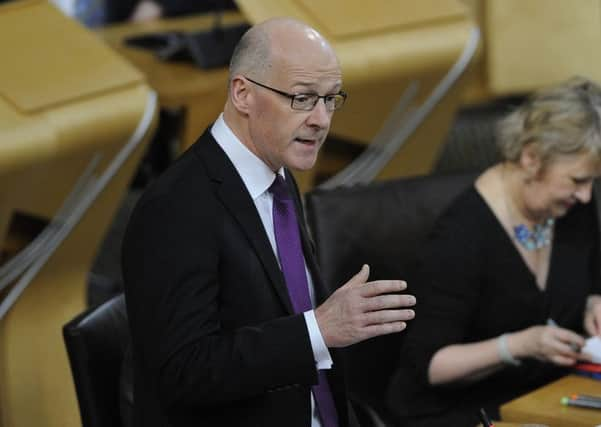John Swinney defends not varying Scots income tax


In his budget on Wednesday, the Deputy First Minister announced the Scottish rate of income tax would be set at 10p - keeping rates unchanged and avoiding the prospect of Scots paying more than taxpayers south of the border.
Significantly, it was the first time the Scottish Government has had to set the new tax rate, which comes in from April next year as a result off the 2012 Scotland Act.
Advertisement
Hide AdAdvertisement
Hide AdMore extensive powers, which will give MSPs the ability to alter income tax rates and bands, are due to come in just a year after that as the UK Government seeks to implement the Smith Commission reforms.
Mr Swinney has pledged to outline the SNP’s intentions ahead of next year’s May Holyrood elections, saying he needs to know what the deal will be on Scotland’s future funding before he makes that decision.
• READ MORE: Budget: What it all means for Scots in 2016
Tory MSP Murdo Fraser said Mr Swinney has “thrown away the opportunity to complain about what he calls Tory austerity and Tory cuts from Westminster”.
Mr Fraser told BBC Radio Scotland’s Good Morning Scotland programme: “He can’t have it both ways. He can’t on the one hand say it’s wrong his budget is being squeezed because of so-called Tory cuts from Westminster - incidentally this budget is nearly £400 million higher than the budget for the current year, so I can’t see where the cuts are coming from.
“But he had the answer himself, he could have chosen if he wanted to take a different route, he could have chosen to have more resources available to him by using the tax powers the SNP have been campaigning for for years and he bottled it.”
But the Deputy First Minister argued the limited powers now available to Scottish ministers would not have allowed him to target income tax rises at wealthy Scots.
“In principle I am in favour and the Government is in favour of progressive taxation,” he told the programme.
“We have to make judgements on the application of that principle within the financial context in which we operate on a year-to-year basis.”
Advertisement
Hide AdAdvertisement
Hide AdHe added that he hoped to have “clarity” over how new powers coming to Scotland would affect the funding the country receives from Westminster early in the new year and vowed: “I will go back to parliament and set out before the election the longer-term intentions of the Scottish Government on the wider questions of taxation and the use of the powers that come from the Smith Commission.”
With his budget switching £250 million from health to councils to improve social care, Mr Swinney hailed this as “one of the largest reforms in health and social care there has been since the foundation of the National Health Service in 1948”.
• READ MORE: Budget: Swinney leaves Scots income tax alone
But council leaders have complained the £10.3 billion funding package for local government leaves them facing a £350,000 funding cut, which could result in 15,000 job losses.
Mr Swinney did not accept that was the number of posts that would have to be cut, adding: “What I’m prepared to consider with local government is how we take forward the implementation of the Government’s budget and I’m open to that conversation with local government.
“There is a way we can reform the delivery of health and social care services at local level by injecting resources, fresh resources, new resources, through the investment in the health service that will enable us to integrate local authority and health care services in all of our communities.”
Labour’s Jackie Baillie told BBC Radio Scotland Mr Swinney’s spending plan for 2016-17 “was not a long-term anti-austerity budget” and was instead “a budget for an election”.
Liberal Democrat leader Willie Rennie said: “John Swinney had the option to end austerity, as he puts it, but he chose not to.”